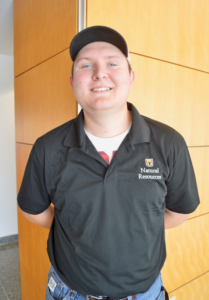 Cole Diggins is a senior studying Soil, Environmental and Atmospheric Science. We asked him a few questions about his perspective on research.
Cole Diggins is a senior studying Soil, Environmental and Atmospheric Science. We asked him a few questions about his perspective on research.
What research have you done?
“At the University of Missouri, I have worked on an undergraduate research project in the soil physics lab for the last two years. My project focuses on how biofuel crop production may influence the speed at which water moves through soil, the amount of water retained in the soil, and the bulk density of the soil (dry soil per volume). I have primarily focused on this topic while here at the university, but prior to that, while in high school, I was very active in the FFA agriscience competitions. That informal research focused largely on pollinator preservation and identifying natural, pollinator-friendly insect repellents.”
In your own words, what is the significance of research? What does it mean to you?
“Research is incredibly significant because it is how our species has continued to progress throughout history. It is research that first spurred the concepts of farming, building and medicine thousands of years ago, as these ideas had to be tested at some point. Research continues to change how we interpret even the most mundane things every day. To me, research is the answer to many of the growing issues we face today. Be it climate change or the coronavirus, research is the only way to fully understand what problems we currently face, what is yet to come, and how best to deal with it. Research is the key to finding answers to a multitude of questions, such as sustainably feeding our already overpopulated world or producing lifesaving vaccines.”
Do you think people have misconceptions about what research is?
“I feel there is a large disconnect between how people view research and how broad it really is. Some people see it as a this “notebook and pencil” image when in truth most people conduct research every day. Whenever someone takes a different path home from work, searching for a quicker way, that person is in that moment testing a hypothesis. When engineers are given an artsy design for a future structure, they often research a new way of building this unique structure in order to maintain its longevity and safety. When designers sew a new clothing design, plant breeders cross a new combination of genetic lines, or whenever one tries an old family recipe with a little more ground pepper, research is conducted. “
How has research informed/changed your education experience?
“Participating in research hasn’t as much changed my educational experience as it has enriched it. Conducting research has helped me to better understand my studies, making me a better student and future job applicant. Research has left me more disciplined and skilled, preparing me for advanced academic pursuits in graduate school and later in the workforce. For me, the best thing about my research experience has been the advice provided me by my adviser, Dr. Stephen Anderson. His insights on how to conduct research have been one of the richest learning experiences of my life.”
What do you plan on doing after college? Has your experience with research influenced what you want to do with your life?
“After graduating in May, I plan to attend graduate school, pursuing a PhD in Soil Science. Prior to conducting research, I had no further educational plans past receiving my bachelor’s degree and now I am on a path to achieving one of the highest academic titles in my field. As a first-generation student, I owe a great deal to the McNair Scholars Program for encouraging my involvement in undergraduate research. Thanks to my experiences as an undergraduate researcher, I have found my passion and identified future career goals as a researcher.”